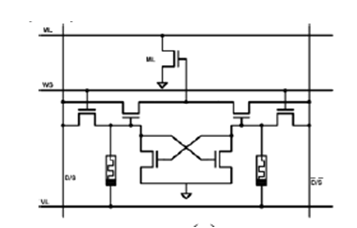Improved High Speed or Low Complexity Memristor-based Content Addressable Memory (MCAM) Cell
Abstract
In this project new approach for nonvolatile Memristor-based Content Addressable Memory MCAM cell using Memristor with CMOS processing technology in order to get high speed read/write operations within high packing density and low power dissipation is proposed. The proposed cell uses only two memristors as a memory cell and CMOS controlling circuitry which uses latching to decrease time required for writing. Moreover, less complexity has been achieved by using the same lines for read and write signals. On the other hand, proposed cell use latching to decrease write time and get nondestructive read operation. As a consequence, the proposed cell provides static power dissipation prevention and no opportunity for losing data.
NOTE: Without the concern of our team, please don't submit to the college. This Abstract varies based on student requirements.
Block Diagram

Specifications
Software Requirements:
- H-spice
- Technology files: 180nm
Hardware Requirements:
- Microsoft® Windows XP
- Intel® Pentium® 4 processor or Pentium 4 equivalent with SSE support
- 512 MB RAM
- 100 MB of available disk space
Learning Outcomes
- Introduction to memristors, TCAM
- Importance of Memristor based designs
- Need of CAM in Routers and wireless applications.
- Transistors & its applications
- Types of Transistors
- Logic Gates using Transistors
- Pull Up and Pull Down networks
- Importance of Transistors
- MOS Fundamentals
- NMOS/PMOS/CMOS Technologies
- How to design circuits using Transistor logic?
- Design of CAM using combination of transistors and memristors.
- How to design low power, high speed area efficient transistor level circuits?
- Drawbacks in CMOS technology
- Scope of Memristor based CAM in today’s world
- Applications in real time
- H-Spice tool for design and simulation
- Solution providing for real time problems
- Project Development Skills:
- Problem Analysis Skills
- Problem Solving Skills
- Logical Skills
- Designing Skills
- Testing Skills
- Debugging Skills
- Presentation skills
- Thesis Writing Skills





 Paper Publishing
Paper Publishing
